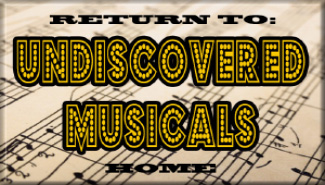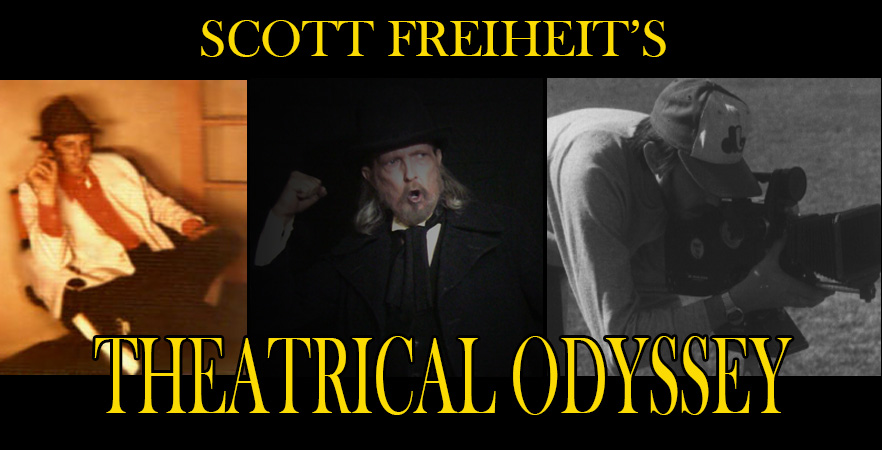

My theatrical "career" began in 1966, when I was 6-years-old, and started making movies in my backyard with an 8mm camera. My first screenplay was an epic telling of the story of the Battle of the Alamo, which not surprisingly I found somewhat difficult to stage in my backyard, though it didn't stop me from trying. When I was 8, I saw the film version of the musical "Oliver!" so many times that I memorized it but didn't really embrace musical theatre until I was 12 and fell in love with "Man of La Mancha". I attended a small private school in Arcadia, California, Rio Hondo Prep, that undertook the ambitious task of staging an original musical each year which was written by the students and faculty. This greatly inspired me to try my hand at writing my own musicals.
When I was 13, I wrote my first "mini-musicals" of about 20-30 minutes in length which I filmed with a Super 8 sound camera. Some of these early efforts were seen in film festivals around the world. At 14 I wrote my first full-length musical,"Cervantes", a biography of the author of "Don Quixote", the book on which my beloved "Man of La Mancha" was based. I followed that with a haunted house musical called "Welcome Home Mr. Carlton" which would play a major role in my life for the next 12 years or so.
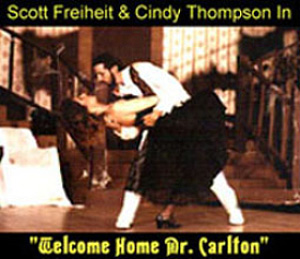 In high school, I continued to develop my musical theatre
skills on stage as well as behind the scenes. I went to Monrovia High
for my senior year and got an extraordinary opportunity to grow and develop as an artist,
directing and starring in "Fiddler on the Roof," "Man of La Mancha," and "The Fantasticks," as well as playing the male
lead in "I Remember Mama," and "The Sound of Music" all in the same year! When I graduated from high
school in 1978, I started a theatrical production company and staged
"Welcome Home Mr. Carlton" at a local auditorium. The show was
well-received by the few people who saw it, but was a total financial
failure. Undaunted, I mounted a small touring version of the show and
played it at places like Elks Lodges and Masonic Temples. It became
the "Winchester Mystery House" of musicals as I just kept changing and
adapting it over the years. In 1980 it played at the Hollywood Actors'
Theatre and in 1986 it was staged for local cable television. Finally
I realized that it was time to move on to other projects. I came out of
high school convinced that I was just one step away from Broadway and
spent a decade realizing just how elusive that dream would prove to
be, however it was a fantastic educational opportunity to take a piece and
work it in front of an audience for a period of years and I learned a great
deal from that experience.
In high school, I continued to develop my musical theatre
skills on stage as well as behind the scenes. I went to Monrovia High
for my senior year and got an extraordinary opportunity to grow and develop as an artist,
directing and starring in "Fiddler on the Roof," "Man of La Mancha," and "The Fantasticks," as well as playing the male
lead in "I Remember Mama," and "The Sound of Music" all in the same year! When I graduated from high
school in 1978, I started a theatrical production company and staged
"Welcome Home Mr. Carlton" at a local auditorium. The show was
well-received by the few people who saw it, but was a total financial
failure. Undaunted, I mounted a small touring version of the show and
played it at places like Elks Lodges and Masonic Temples. It became
the "Winchester Mystery House" of musicals as I just kept changing and
adapting it over the years. In 1980 it played at the Hollywood Actors'
Theatre and in 1986 it was staged for local cable television. Finally
I realized that it was time to move on to other projects. I came out of
high school convinced that I was just one step away from Broadway and
spent a decade realizing just how elusive that dream would prove to
be, however it was a fantastic educational opportunity to take a piece and
work it in front of an audience for a period of years and I learned a great
deal from that experience.
During the "Carlton years" I was, of course, developing other material. I, like many others, wrote a musical adaptation of "Cyrano de Bergerac" and started one based on "The Count of Monte Cristo". I wrote a small-scale, original musical called "The Dream Factory" which had a very strong musical score, but a difficult book to get a handle on. While "The Dream Factory" will probably never be staged, it has served as a "feeder" for many of my other projects, as I have stolen songs from it, time-after-time, over the years. Someday it might be interesting to record all of those songs with their original lyrics, even if I never do write a book to go along with it! I think it would be a very nice collection of tunes.
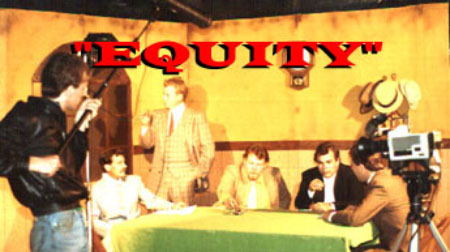 While serving as a Cable Television Commissioner for the City
of Monrovia, California, I became very involved with Community Access
Cable Television, which had many similarities with the original
spirit of the Internet. It was all about people creating and sharing
their creations with others. There was no money involved, and no
advertising allowed. Anyone could produce television programs and have
them aired on their local cable channel, or "bicycled" to channels
all across the country. I started a community theatre group called
The Gem City Players to produce new works exclusively for cable.
Our most ambitious project was staging a new musical that I had
written about the Actor's Equity strike of 1919, called "Equity".
Since the cable productions had to be non-profit, and
non-commercial, my business partner Anthony Everitt and I were producing all of these
shows out of our own pockets. Eventually we simply ran out of money
and "Equity" went back on the shelf before we
could complete the videotaping. We did manage to complete a number of
productions, including the award-winning Civil War short subject
"Of a Common Bond" as well as the shot in front of a live
audience production of "Welcome Home Mr. Carlton," mentioned earlier.
While serving as a Cable Television Commissioner for the City
of Monrovia, California, I became very involved with Community Access
Cable Television, which had many similarities with the original
spirit of the Internet. It was all about people creating and sharing
their creations with others. There was no money involved, and no
advertising allowed. Anyone could produce television programs and have
them aired on their local cable channel, or "bicycled" to channels
all across the country. I started a community theatre group called
The Gem City Players to produce new works exclusively for cable.
Our most ambitious project was staging a new musical that I had
written about the Actor's Equity strike of 1919, called "Equity".
Since the cable productions had to be non-profit, and
non-commercial, my business partner Anthony Everitt and I were producing all of these
shows out of our own pockets. Eventually we simply ran out of money
and "Equity" went back on the shelf before we
could complete the videotaping. We did manage to complete a number of
productions, including the award-winning Civil War short subject
"Of a Common Bond" as well as the shot in front of a live
audience production of "Welcome Home Mr. Carlton," mentioned earlier.
During this time I also did a lot of work on the renovation of the famous Pasadena Playhouse, and there was a lot of talk about staging some of my shows there and a suggestion that when the theatre finally opened I would be a good candidate for its first Artistic Director but none of those things came to pass, but we did get the old place up and running again.
Throughout the 1980's I continued to write new musicals and re-work the old ones. The burden of staging these shows with my own, very limited, financial resources had gotten too great. I decided, instead, to take the more conventional route of creating demo packages and trying to interest professional theatres and/or producers in getting involved with the project. In the late 80's I was looking for the right vehicle for this purpose and thought that an adaptation would be easier to sell than a completely original story. Most Broadway musicals come from some other source, and it's much easier to describe your project in a "pitch" by saying it's a musical version of "The Phantom of the Opera" than to go into a long-winded explanation of something totally new and different. I was leaning towards "Les Miserables", by Victor Hugo, when someone else beat me to the punch. I understand their show has enjoyed some modest success! My next choice was "The Scarlet Letter" by Nathaniel Hawthorne, but the complexity of the novel seemed too challenging to pursue at the time. Then a bolt of creative lightning struck me and I wrote a musical that marked a turning point in my career as an author/composer.
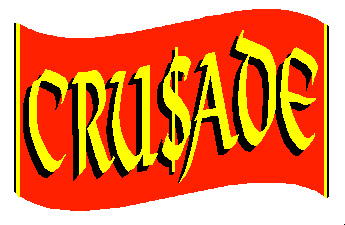 "Crusade" was everything that I had tried to avoid. A completely original story with a very difficult plot to describe, and
a musical that was quite unlike anything I had ever seen or heard of. Anthony Everitt, whose job it would be to promote the project, thought I was
out of my mind...until he heard the score. "Crusade" is a simple show, on the surface, with many, many layers and levels of
subtext. It has a "fairytale-esque" feel to it, but it is not set in any definite time or place. It was also my first complete "pop opera"
and a radical departure from my usual style, in many respects. On paper, it would be very hard to describe the show the way I knew I
would stage it. The only easy thing about promoting this show was the title. But "Crusade" was special. Even my friends
who aren't easy to please were impressed. Everyone said that this was the one that was going to make it. For two years I threw everything
I had into the development of this show. Every waking hour, and every penny I could lay my hands on. (Unfortunately, pennies were often all
I could lay my hands on!)
"Crusade" was everything that I had tried to avoid. A completely original story with a very difficult plot to describe, and
a musical that was quite unlike anything I had ever seen or heard of. Anthony Everitt, whose job it would be to promote the project, thought I was
out of my mind...until he heard the score. "Crusade" is a simple show, on the surface, with many, many layers and levels of
subtext. It has a "fairytale-esque" feel to it, but it is not set in any definite time or place. It was also my first complete "pop opera"
and a radical departure from my usual style, in many respects. On paper, it would be very hard to describe the show the way I knew I
would stage it. The only easy thing about promoting this show was the title. But "Crusade" was special. Even my friends
who aren't easy to please were impressed. Everyone said that this was the one that was going to make it. For two years I threw everything
I had into the development of this show. Every waking hour, and every penny I could lay my hands on. (Unfortunately, pennies were often all
I could lay my hands on!)
I had an old 8-track reel-to-reel recorder left over from my days as a rock musician and 'Beatle' impersonator (I was 'Paul', by the way) that I was planning to record the demo with. Unfortunately, the old machine wasn't working too well and the best we could do was buy a used 4-track cassette recorder. I had just finished playing 'Juan Peron' in a production of "Evita" which had an incredibly strong cast, especially the lead, Kayre Morrison. I invited her to sing the female lead on the "Crusade" recording and started a long association that continues to this day.
The finished demo was less than I had hoped for. The performances were very good, but the recording quality was far below the standard I had hoped to set. Still, it was finished, at last, and I assumed that a demo was only supposed to "demonstrate" what the show would be like with proper funding. How wrong I was. Yet another painful lesson that I learned the hard way. Our first responses, however, were very encouraging. We had decided to try the "Webber and Rice" route of selling the project as a record album first, and several recording companies were intrigued. A producer with Hollywood Records heard the demo and thought that some of the songs had definite Top 40 potential. He said he would pitch the project to the brass at Hollywood. Despite many attempts to contact him, we still haven't heard back! Poly Gram loved it. They kept telling us that they loved it. They kept telling us that they were trying to figure out what division should handle it. Finally, they told us that even though they loved it, they couldn't figure out what to do with it and wished us the best of luck. There were a variety of other responses, an assortment of the usual form-letter rejections, and a few people who just never got back to us at all. It appeared that "Crusade" was going to have to make it as a musical play first, and not a "concept" album. Oh, well. After a few years and a ton of promotional money down-the-drain we were ready to try anything!
We started contacting regional theatres and theatrical producers. We tried everyone from small playhouses to Cameron Mackintosh. (It's kind of funny that Cmeron Makintosh says in interviews that his door is always open to new material and that he will listen to anything that's sent to him. The three shows that we have attempted to get him, or his organization to listen to have all gotten form-letter rejections stating that they never read material that isn't submitted from an agent, even when their own staff had invited us to send a package!) Unfortunately I have learned that what many people say in interviews and what they actually do in real life are often two very different things.
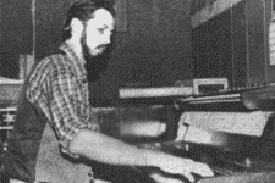 The results everywhere were less than spectacular. One person hated it so much that he could barely
restrain himself! He called it the worst musical ever written. A complete failure on every level. Not one thing about the show, or the
recording was worth listening to. The singers were all terrible, the orchestrations were outdated and poorly arranged, the lyrics offensive,
and the music completely forgettable. He said we should tear it up and move on to something else (like plumbing) as this
show was so hopelessly bad that it could never be repaired. Not exactly the response we were hoping for, but a response, none-the-
less. I'm not even being sarcastic in saying that I would rather get trashed than ignored. It's really annoying to spend years of your life creating
something only to have it rejected by form letter which tells you absolutely nothing. Most of the regional theatres in this country
operate that way, and it's a terrible shame. Without "feedback" an author has no idea of how to improve his or her work. These non-profit
institutions are supposedly dedicated to the development of new work, but in my experience, they operate more like big commercial enterprises.
Surprisingly, some of the big companies are more responsive than the non-profit regional theatres! Very confusing.
The results everywhere were less than spectacular. One person hated it so much that he could barely
restrain himself! He called it the worst musical ever written. A complete failure on every level. Not one thing about the show, or the
recording was worth listening to. The singers were all terrible, the orchestrations were outdated and poorly arranged, the lyrics offensive,
and the music completely forgettable. He said we should tear it up and move on to something else (like plumbing) as this
show was so hopelessly bad that it could never be repaired. Not exactly the response we were hoping for, but a response, none-the-
less. I'm not even being sarcastic in saying that I would rather get trashed than ignored. It's really annoying to spend years of your life creating
something only to have it rejected by form letter which tells you absolutely nothing. Most of the regional theatres in this country
operate that way, and it's a terrible shame. Without "feedback" an author has no idea of how to improve his or her work. These non-profit
institutions are supposedly dedicated to the development of new work, but in my experience, they operate more like big commercial enterprises.
Surprisingly, some of the big companies are more responsive than the non-profit regional theatres! Very confusing.
Not everyone hated the show, and some were quite complimentary, but the bottom line was the same. No one wanted to risk their money on this project. Producing a musical is very expensive. I can tell you that from personal experience! Producing one on a professional level is astronomically expensive. "Crusade" sadly slipped by the wayside after many years of hope and expectation. For a time I thought I was through as a composer. I didn't believe that I was capable of writing anything better than "Crusade", and since that had failed so completely, I spent more time on screenplays and video production.
Finally, I decided that I didn't need a better musical, I just needed to try with a different musical. After starting a show called "George Washington Never Slept Here", a musical about historic preservation, "political correctness" and a love triangle, if you can believe that, the creative lighting bolt struck me again and "Julius Caesar Conquers the Martians" was born.
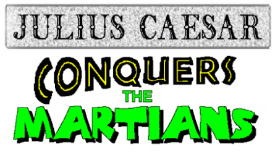 The idea popped into my head on January 30, 1994 and by February 11th the entire thing was complete...book...music...lyrics...
orchestrations....everything! I didn't stop to eat or sleep, I was just possessed with this wacky little story about a very bad movie
studio in the late 50's and early 60's. Suddenly I had something with commercial potential written all over it. It was a straight-forward
comedy with an easy plot to describe, it catered to the growing interest, at that time, in "B" movie nostalgia, had a very tightly constructed
book and a catchy musical score with a couple of potential pop hit songs, and a couple of amusing novelty numbers. But most of all, it
had that title. Just hearing the title makes people laugh. Everyone is curious. This time I thought I had really struck pay-dirt. If
no one wanted to buy my art, I was sure they would buy my commerce.
The idea popped into my head on January 30, 1994 and by February 11th the entire thing was complete...book...music...lyrics...
orchestrations....everything! I didn't stop to eat or sleep, I was just possessed with this wacky little story about a very bad movie
studio in the late 50's and early 60's. Suddenly I had something with commercial potential written all over it. It was a straight-forward
comedy with an easy plot to describe, it catered to the growing interest, at that time, in "B" movie nostalgia, had a very tightly constructed
book and a catchy musical score with a couple of potential pop hit songs, and a couple of amusing novelty numbers. But most of all, it
had that title. Just hearing the title makes people laugh. Everyone is curious. This time I thought I had really struck pay-dirt. If
no one wanted to buy my art, I was sure they would buy my commerce.
This time we decided to do it right. We rented a state-of-the-art digital multi-track recorder and other top-of-the-line, professional audio gear and recorded an "album quality" demo tape of the entire score. Once again Kayre Morrison lent her incredible talent to the project, and we finally had a demo that we were proud of. We also used our growing video resources to produce a promotional videotape. Various companies had foolishly sent me credit cards, and we put them to good use! (If only I had some way of paying them back.)
The "Julius Caesar Conquers the Martians" demo package was as slick and professional as you could get. And the show itself was very solid. We waded out into the theatrical rapids once more, only this time we were sailing a battleship instead of a canoe.
Needless-to-say, the results were no better than the first time, otherwise you wouldn't be reading about it in the Undiscovered Musicals page. We got a million different rejections. Most of them rather complimentary. Everyone seemed to like it (we didn't send it to the gentleman who had blasted "Crusade") but the bottom line was the same. No interest in producing, co-producing or investing in the project. Even a tiny theatre in Sierra Madre turned down our offer to produce the show with our money at their facility and split the box office with them. We offered to provide special promotions for the theatre like running cable TV ads. They had a vacant slot on their schedule and were desperately trying to fill it. Not desperate enough, I guess. In the end, they decided to produce a play written by a good friend of mine, and former Gem City Player, the late, great Jack Chansler, so at least something good came out of it.
Eventually the show was completely overhauled and even given a new title, "Cleopatra and the Slave Girls of Venus," at the request of a theatre that was going to produce the show but never did. Fortunately I liked the changes and so did a company called Heuer Publishing, which now handles the amateur rights for it.
"The Scarlet Letter" had always intrigued me, and finally in 1995, at the age of 35, I felt I was ready to tackle it. The result was a unique kind of "book" musical. One that weaves music and dialogue throughout the story instead of simply stopping the play to belt out a tune. I think it's my finest work, to date and it came very close to getting a professional staging in Hungary (which you can read more about here) but in the end it went nowhere. I suppose I should have worked harder to promote it after the Hungarian production fell through but it can be really, really, painful to pick up the pieces after a long and heartbreaking disappointment.
Prior to "The Scarlet Letter" I had written something called "The Ancient Staff of Wisdom." That had started out as a non-musical screenplay but somewhere along the line I got in the mood to write music for it. I had a demo with just me singing all the songs, as opposed to different actors playing all of the different roles, which is usually just the jumping off point for me but the people in Hungary were interested in that show too so I brought it along with me when I went to Budapest for "The Scarlet Letter." (Or "A Skarlát Betű," as it was known over there.) There were some discussions and meetings but no production was mounted and since then I have so far done absolutely nothing with it to either make a decent recording or pitch the show to anyone anywhere else. Maybe someday...if I live long enough!
My original Undiscovered Musicals web page had a feature where authors could post notices looking for collaborators. When I saw a posting by T.G. Roaman that said that she had written a play about Edgar Allan Poe and was hoping to turn it into a musical I actually used my own device and the result was "Dark Destiny." This time we were able to produce a very high quality recording of the score and there were quite a few offers for prouctions around the world but none of them ever happened. There seems to be a tremendous turnover in the Artistic Director community so that when someone approaches you there's a good chance that they will be gone before your show ever sees the light of day and the new Artistic Dirctor will be very skeptical of anything left over from the old regime. This has happened dozens and dozens of times. A theatre is usually looking way down the line, sometimes a year or more in advance, and a lot of things can happen in between, most of them bad if you're an author! (I don't know how many times someone has "lost" our package and requested a new one, something that wouldn't be so bad today with electronic communications but something that cost a fortune in printing and postage back in the old days.)
Eventually GeoCities, the original home of Undiscovered Musicals, went away and my enthusiasm for musical theatre began to slip away as well. I reworked some old things and toyed with a few new ideas but instead I went back to rock and roll and filmmaking, had a couple of heart attacks, discovered the wonders of 3D animation and produced a number of short subjects and a couple of web series. I also knocked out a bunch of novels but stayed away from musicals for the most part, despite my love and passion for them.
Then for no good reason at all I was inspired to write a musical adaptation of "Moby Dick" and even got motivated to rebuild my old web page. I guess I just couldn't stay away forever. So now I'm preparing to do battle again in my never-ending quest to bring my musicals to the public. To fail on Broadway would be a disappointment, but to never have the chance to succeed, or fail, will destroy my spirit, in the end. I am running out of money, running out of time, and running out of the kind of energy that it takes to push something like this through. After more than 50 years of writing and with more than 100 plays and musicals to my credit, I am still desperately trying to break through, at an age when most people are thinking of retirement. I've been close a few times, tantalizingly close. I used to believe that success was inevitable. Than I startetd to believe that it was still possible. Now I just hope.
Musicals had largerly fallen by the wayside for me until I wrote "Moby Dick" and suddenly got interested in them again. Over the years a lot of files have gone missing and old recordings show their age hopelessly and I realize I have a lot of work to do on some of my shows if I ever want to get them back into a production-ready state. I have no idea whether I'll find the time or energy to do that but this web page is a first tentative step. I've devoted a great deal of my life to creating musical plays that nobody has ever seen or heard of and it would be nice to know that a few more of them had made their way out into the world. If nothing else I hope to continue inspiring and encouraging other people to forge ahead with their musical dreams. Perhaps their luck will be a little better than mine has been.
As it was, when I started this page back in 1990's, this is just a message in a digital bottle. Maybe someone will stumble upon this page and be intrigued enough to give my work a listen but more than anything it's a statement of my commitment to do what I love doing or die trying. (Literally. While shooting the promotional video for "Moby Dick" I actually collapsed from heat exhaustion! It does make for an amusing outtake though.) The message isn't all gloom and doom but I try to be as honest with people as possible. There's so much ego and self-aggrandizing in this business that I think it's good to hear all sides of the story sometimes. In the end you'll never quit if it's in your blood. You can hook a race horse to a plow, but he'll never lose the desire to run. If anyone else feels the same way let me know. Sometimes it's a very lonely race.
